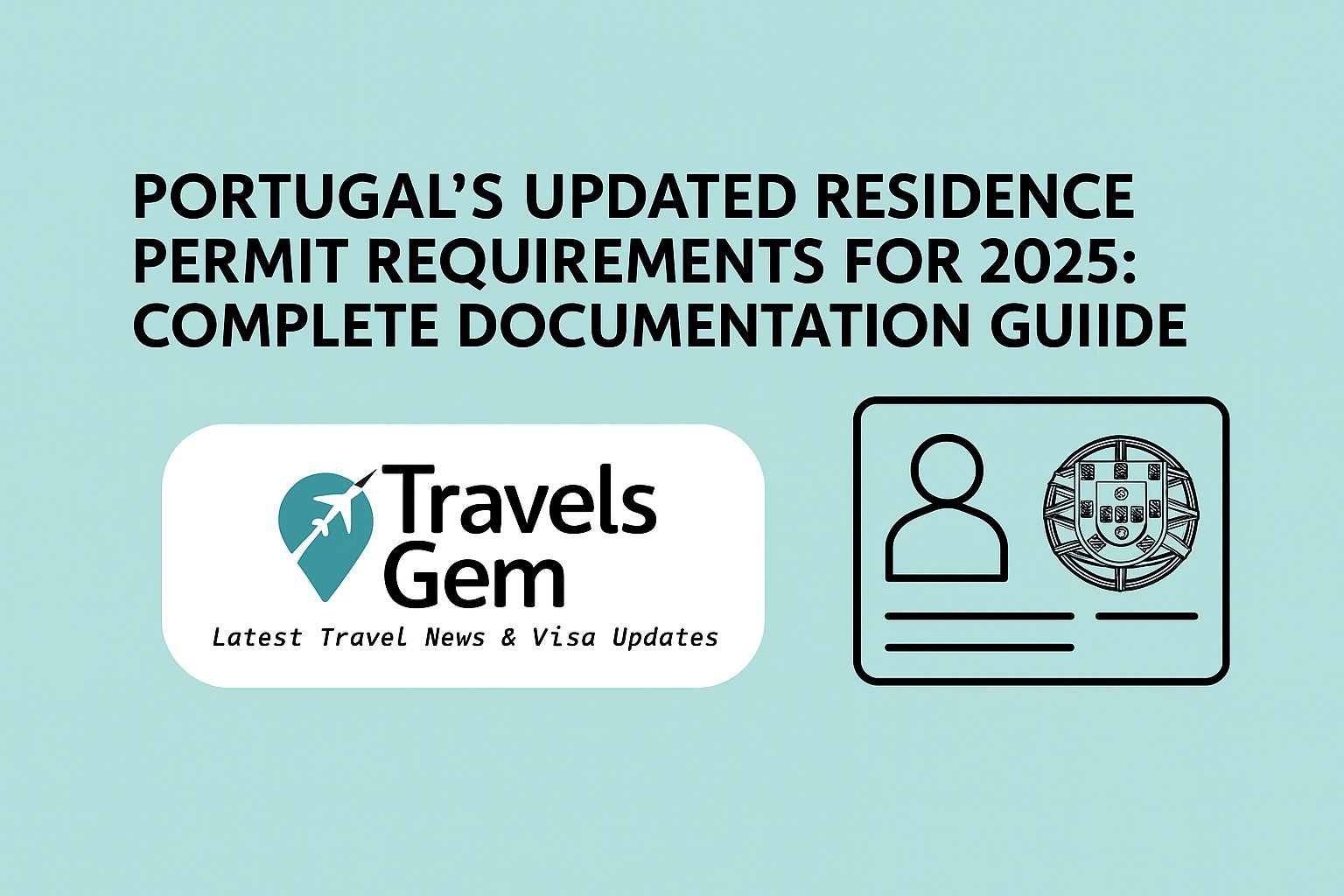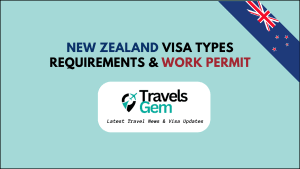Portugal, a beacon for expatriates, investors, and digital nomads, has introduced stricter regulations for residence permit applications and renewals, effective April 28, 2025. The Agency for Integration, Migration, and Asylum (AIMA) now mandates that all applications be submitted with complete documentation at the outset, a significant shift from previous practices that allowed partial submissions. This change aims to streamline processing, reduce a backlog of over 400,000 pending cases, and enhance efficiency in Portugal’s immigration system. This comprehensive guide explores the new rules, required documents, application processes, and implications for applicants, based on up-to-date research as of April 30, 2025.
Background: Why the Change?
Portugal’s immigration system has faced challenges due to surging demand for residence permits, driven by programs like the Golden Visa, D7 Passive Income Visa, and Digital Nomad Visa. The influx of applications, particularly from non-EU nationals, has strained AIMA’s capacity, leading to delays of up to 12–15 months for approvals. In response, the government enacted Decree-Law No. 41-A/2024, effective June 29, 2024, which extended the validity of expiring permits until June 30, 2025, to ease pressure on applicants. However, persistent backlogs prompted AIMA to implement stricter rules, ensuring only complete applications are processed to expedite decision-making.
The new policy, aligned with Law 23/2007 and Regulatory Decree 01/2024, reflects Portugal’s broader efforts to modernize its immigration framework. Recent reforms, such as the 20-day work visa and unified identification number, underscore this commitment. By requiring full documentation upfront, AIMA aims to reduce administrative bottlenecks and provide applicants with faster, more predictable outcomes.
Key Changes to Residence Permit Applications
As of April 28, 2025, the following rules apply to all residence permit applications and renewals:
- Complete Documentation Mandatory: All legally required documents must be submitted at the time of application. Incomplete submissions are rejected outright, unlike previous policies that allowed applicants to provide missing documents later.
- No Grace Period for Incomplete Applications: Applicants must ensure all paperwork, including translations and notarizations, is ready before submission.
- Online Submission via AIMA Portal: Most applications are filed electronically through AIMA’s Residence Permit for Investment Scheme (ARI) portal or the SEF Portal, streamlining the process but requiring digital proficiency.
- Extended Validity of Permits: Permits expiring on or after February 22, 2020, remain valid until June 30, 2025. Beyond this date, holders must provide proof of a scheduled renewal appointment to maintain legal status.
- Biometric Data Collection: Applicants must attend an in-person appointment at an AIMA office to submit fingerprints and facial images, typically scheduled 9–12 months after initial approval.
These changes apply to all residence permit types, including those for work, study, family reunification, investment (e.g., Golden Visa), and passive income (e.g., D7 Visa).
Required Documents for Residence Permit Applications
The specific documents required vary by permit type, but a core set of materials is universally mandated. Below is a detailed list of common requirements, with additional documents noted for specific permit categories:
General Requirements
- Valid Passport: Must have at least six months of validity remaining. Copies of all relevant pages, including entry stamps, are required.
- Residence Visa (if applicable): Non-EU nationals must present a valid residency visa (e.g., D7, D8, or Golden Visa) issued by a Portuguese embassy or consulate.
- Tax Identification Number (NIF): Obtained from the local tax office (Finanças) to verify tax status.
- Proof of Accommodation: A rental agreement, property deed, or letter from a host, notarized and valid for the permit duration.
- Health Insurance: Comprehensive coverage valid in Portugal, meeting EU standards.
- Criminal Record Certificate: Issued by the applicant’s country of residence or origin, apostilled and translated into Portuguese by a certified translator.
- Application Form: Completed and signed, available on AIMA’s website or the SEF Portal.
- Proof of Subsistence: Evidence of sufficient funds to support oneself and dependents, typically €10,440 annually (equivalent to 12 months of Portugal’s minimum wage of €870/month) for the main applicant, plus 50% for each adult dependent and 30% for each child.
- Two Passport-Sized Photographs: Sized 4.5×3.5 cm, meeting biometric standards.
Additional Documents by Permit Type
- Golden Visa (Residence Permit for Investment Activity):
- Proof of qualifying investment (e.g., €500,000 in an approved fund or €250,000 donation to cultural heritage).
- Bank statement confirming fund transfer to a Portuguese account.
- Declaration from the fund manager or cultural organization verifying the investment.
- D7 Passive Income Visa:
- Evidence of stable income (e.g., pensions, rental income, or investments) of at least €870/month for the main applicant.
- Bank statements for the last six months, showing funds in a Portuguese account.
- Digital Nomad Visa (D8):
- Employment contract or partnership agreement proving remote work for a non-Portuguese employer.
- Bank statement confirming a minimum monthly income of €3,480 (four times the Portuguese minimum wage).
- Proof of savings of at least €10,440 in a Portuguese bank account.
- Work Permit:
- Employment contract or job offer from a Portuguese employer, verified by the Portuguese Labor Authorities.
- Professional certificates for regulated professions, translated and notarized.
- Student Visa:
- Acceptance letter from a recognized Portuguese educational institution.
- Proof of tuition payment or scholarship.
- Family Reunification:
- Marriage or birth certificates, apostilled and translated, to prove family ties.
- Proof of dependency for adult children or parents (e.g., financial support records).
- Volunteering or Cultural Activity:
- Contract with a certified hosting entity, detailing the program’s duration and objectives.
- Evidence of civil liability insurance from the host organization.
Document Preparation Notes
- Apostille and Translation: Documents such as criminal records, birth certificates, and marriage certificates must be apostilled and translated into Portuguese by a certified translator. Notarization is required for translations.
- Digital Submission: Scanned copies must be clear, legible, and in PDF format. Originals are presented during the biometric appointment.
- Verification: AIMA cross-checks documents with international databases, emphasizing the importance of authenticity.
Applicants are advised to consult AIMA’s official website or engage a Portuguese immigration lawyer to confirm requirements for their specific permit type.
Application Process: Step-by-Step
The residence permit application process involves several stages, from document preparation to biometric submission. Here’s a streamlined guide:
- Obtain a Portuguese Fiscal Number (NIF):
- Visit a local tax office or engage a lawyer to secure a NIF, essential for banking and tax purposes.
- Open a Portuguese Bank Account:
- Transfer required funds to demonstrate financial stability. For example, Golden Visa applicants must show investment funds, while D7 applicants need income deposits.
- Gather and Prepare Documents:
- Collect all required materials, ensuring apostilles and translations are complete. Verify compliance with AIMA’s checklist.
- Submit Application Online:
- File the application via AIMA’s ARI portal or SEF Portal. Upload all documents and pay the application fee (approximately €80–€150, depending on permit type).
- Await Initial Approval:
- AIMA reviews the application within 6–8 months. Applicants receive an email notification for scheduling a biometric appointment.
- Attend Biometric Appointment:
- Visit an AIMA office (e.g., in Lisbon, Porto, or Faro) to submit fingerprints and facial images. Dependents can attend simultaneously. Appointments may take 9–12 months to schedule due to demand.
- Background Check and Final Review:
- AIMA conducts background checks, verifying criminal records and investment authenticity (for Golden Visa applicants). This stage takes 2–3 months.
- Receive Residence Permit:
- Upon approval, pay the permit issuance fee (€5,000–€8,000 for Golden Visa; lower for other permits). The permit card is issued within two weeks, delivered in person or via a lawyer.
Renewal Process
- Initial Permit: Valid for one year (Golden Visa: two years). Requires a minimum stay of seven days in Portugal.
- First Renewal: Valid for two years, requiring 14 days’ stay over two years. Submit updated documents (e.g., criminal record, proof of accommodation) 30–90 days before expiration.
- Subsequent Renewals: Valid for two or three years, depending on permit type. After five years, applicants may apply for permanent residency or citizenship.
Implications for Applicants
The new rules have significant implications for prospective residents:
- Increased Preparation Time: Applicants must allocate 2–3 months to gather, apostille, and translate documents, especially for complex permits like the Golden Visa.
- Higher Costs: Notarizations, translations, and legal assistance can cost €1,000–€3,000, in addition to application and issuance fees.
- Risk of Rejection: Incomplete applications are rejected without review, necessitating meticulous preparation.
- Faster Processing for Compliant Applications: AIMA promises “swift” decisions for complete submissions, potentially reducing wait times to 6–8 months for initial reviews.
- Impact on Employers: Companies relocating employees to Portugal must ensure all documents are ready before immigration appointments, as delays could disrupt hiring timelines.
Challenges and Considerations
While the changes aim to improve efficiency, applicants face several challenges:
- Document Complexity: Obtaining apostilled and translated documents from certain countries (e.g., non-Hague Convention nations) can be time-consuming and costly.
- AIMA Appointment Delays: High demand at AIMA offices, particularly in Lisbon, may extend biometric appointment wait times to over a year.
- Language Barriers: Non-Portuguese speakers may struggle with the application process, necessitating legal or translation support.
- Backlog Persistence: Despite the new rules, the existing backlog may delay processing for applications submitted before April 2025.
To mitigate these challenges, applicants should:
- Engage a bilingual immigration lawyer familiar with AIMA’s processes.
- Use accredited visa centers for faster document processing (e.g., 45 days for Digital Nomad Visa applications).
- Apply to less busy AIMA offices (e.g., Faro or Coimbra) to avoid long waitlists.
Benefits of Compliance
Adhering to the new rules offers several advantages:
- Streamlined Processing: Complete applications are prioritized, potentially reducing approval times.
- Legal Certainty: Extended permit validity until June 30, 2025, provides a buffer for renewals.
- Access to Portugal’s Benefits: Successful applicants gain the right to live, work, and study in Portugal, with visa-free travel across the Schengen Area.
- Path to Citizenship: After five years of legal residency (counted from the application date, per the 2024 Nationality Law amendment), applicants can pursue permanent residency or citizenship, granting access to an EU passport and 191 visa-free destinations.
Special Focus: Popular Residence Permit Programs
Golden Visa
The Golden Visa remains a flagship program, attracting investors with a minimum €500,000 fund investment or €250,000 cultural donation. Key documents include proof of investment, bank statements, and a clean criminal record. The program offers a low stay requirement (seven days/year) and a path to citizenship in five years.
D7 Passive Income Visa
Ideal for retirees or those with passive income, the D7 Visa requires proof of €870/month income and €10,440 in savings. Applicants must demonstrate accommodation and health insurance, with family reunification options for dependents.
Digital Nomad Visa (D8)
Designed for remote workers, the D8 Visa demands a €3,480 monthly income and €10,440 in savings. Documents include an employment contract and proof of remote work, with a one-year temporary visa or two-year residency permit available.
How to Prepare for a Successful Application
To navigate the new rules effectively:
- Start Early: Begin document collection 3–4 months before applying to account for apostilles and translations.
- Verify Requirements: Check AIMA’s website or consult a lawyer to confirm permit-specific documents.
- Hire Professionals: Use immigration lawyers or visa consultants to ensure compliance and avoid rejections.
- Monitor Application Status: Regularly check AIMA’s portal for updates on biometric appointments and approvals.
- Plan Finances: Budget for fees, legal costs, and living expenses in Portugal, as proof of subsistence is critical.
Conclusion
Portugal’s updated residence permit rules, effective April 28, 2025, mark a pivotal shift toward efficiency and accountability in the immigration process. By requiring complete documentation upfront, AIMA aims to clear backlogs and deliver faster decisions, benefiting applicants and the broader immigration system. While the changes demand greater preparation, they offer a clearer path to residency for those who comply. Whether pursuing a Golden Visa, D7, or Digital Nomad Visa, applicants must prioritize meticulous document preparation and leverage professional support to succeed.
For the latest updates and detailed requirements, visit AIMA’s official website (www.aima.gov.pt) or contact a Portuguese immigration lawyer. With careful planning, applicants can secure their place in Portugal, enjoying its vibrant culture, robust economy, and unparalleled access to the Schengen Area.





